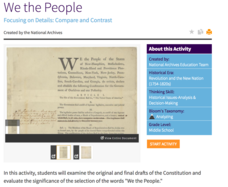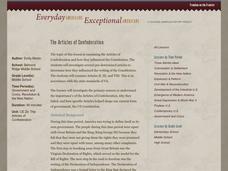PBS
Constitution Day
Travel back to 1787 as young scholars investigate the creation of the US Constitution. After first working in small groups to create sets of classroom rules, students go on to read a summary of the Constitution and watch a short video...
Curated OER
Our Classroom Constitution
Develop a system of classroom rules created by the kids, for the kids with this three-part lesson series on the US Constitution. After learning about the structure of the Constitution and the government it established, young scholars...
TCI
Celebrating Our Constitution
School House Rock's "Preamble" launches a study of the Preamble of the US Constitution and the relevance of this 200 year-old document today.
Carolina K-12
Principles of the US Constitution
After breaking into groups according to major principles of government (i.e., popular sovereignty, separation of powers, checks and balances, etc.) in the United States, your class members will produce public service announcements...
Curated OER
The Bill of Rights is for US Today
The first ten Amendments of the U.S. Constitution are vital for young people to understand. Provide the foundation of the laws that govern our country with this junior high school lesson. Groups use the newspaper to identify rights...
PBS
Constitution Day
September 17, Constitution Day so named because that was the day in 1787, that 39 men signed the Constitution, is the focus of a series of activities designed to simulate a Constitutional convention and open a study of the US Constitution.
Newspaper Association of America
Game On: Constitution Activities for Elementary through High School
Who would've guessed that a document written over 200 years ago would still have a lot to teach us today? A set of folder games incorporates parts of a newspaper to teach about the Constitution and how it still applies to life today. The...
Friends of Fort McHenry
Privateers in the War of 1812: Soldiers or Thieves?
Do governments have the right to authorize individuals to perform illegal acts during times of war? Did the US government really employ pirates? Use the War of 1812 as your vessel to answering these questions through class discussion and...
Curated OER
Double Jeopardy Clause: A Fifth Amendment Constitution Trivia Game
Here is a wonderful way to introduce your learners to the Fifth Amendment of the Bill of Rights. There are 16 questions designed to generate thinking and discussion questions about the Fifth Amendment. This lesson is extremely...
Judicial Learning Center
About Federal Judges: Qualifications of Judges
"Help Wanted: A Supreme Court Justice." What should be included in the ad? Learners ponder the question during a lively activity that asks them to examine the qualifications for various federal offices and then create job postings....
Advocates for Human Rights
Human Rights Defined
Class members continue their investigation of the factors that influence migration with a lesson on human rights. As they examine the Universal Declaration of Human Rights and selected US Constitutional Amendments, learners compare the...
Classroom Law Project
What does the Constitution say about voting? Constitutional Amendments and the Electoral College
As part of a study of voting rights in the US, class members examine Constitutional amendments connected with voting and the role of the Electoral College in the election process.
C-SPAN
Presidential Birth Requirement
Every president of the United States must be a natural-born citizen, but the definition of natural-born is not as straightforward as it seems. Secondary scholars examine two points of view surrounding the constitutional requirement and...
Curated OER
Voices from Little Rock: Understanding the Civil Rights Movement through Primary Sources
As part of a study of the Civil Rights Movement, class members examine documents associated with the Little Rock Nine, the Brown v. Board of Education ruling, the 14th and 15th Amendments to the US Constitution, and chapters from Melba...
NPR
Progressive Era Lesson Plan
The women working for equal rights in the early 20th century weren't a part of one large group; rather, they were members of dozens of small groups focused on social reform. Explore the ways groups in the Progressive Era like National...
PBS
Evolution of the Presidency: Theodore Roosevelt to Franklin D. Roosevelt
How much power should a president be allowed to exert? Theodore Roosevelt and Franklin D. Roosevelt exercised their power according to their interpretations of the United States Constitution, and these interpretations affected the...
Eau Claire Area School District
Intellectual Property Lesson Plans
Fair use, intellectual property, public domain ... what does it all mean? Scholars act as judges to determine if different scenarios constitute fair use. They also advance their research skills by practicing paraphrasing and citing...
US National Archives
We the People Focusing on Details: Compare and Contrast
Even the most inspiring documents in American history had to go through a few drafts before they were ready for publication. Reinforce the importance of the writing process, as well as the collaborative nature of democracy, with an...
iCivics
Wanted: A Just Right Government
What type of government did American colonists gain and seek after gaining their independence after the Revolutionary War? Here is activity that will guide your young learners through the new nation's progression from the Articles of...
Curated OER
Political Asylum Talk Show
Learners view videos, visit websites, and read about the nature and changes made to the idea of political asylum. Beginning with Jewish refugees fleeing Nazi Germany, they will explore policy change throughout the years. The lesson plan...
PBS
President Theodore Roosevelt: Foreign Policy Statesman or Bully?
Can a negative perception of a president's foreign policy harm his or her historical legacy? A project that winds the clock back to the date of Theodore Roosevelt's death puts students at the editorial desk of a fictional newspaper....
Close Up Foundation
Rights Auction
In an engaging activity on universal and unalienable rights, learners work in groups to establish a democratic nation and determine what principles they want to protect to ensure a democratic society. They conduct a "rights auction" in...
Foreign Policy Association
U.S. and Europe Online Lesson Plan
Class groups investigate the economic and political implications of a country's policies on genetically modified foods, craft a position paper detailing that policy, and share their findings with the class. Armed with this information,...
Roy Rosenzweig Center for History and New Media
The Articles of Confederation
Have you ever started a project only to realize you need to scrap it and start over? Scholars analyze the issues leading to the fall of the Articles of Confederation. A group investigation into Articles II, III, and VIII unveil the...

























